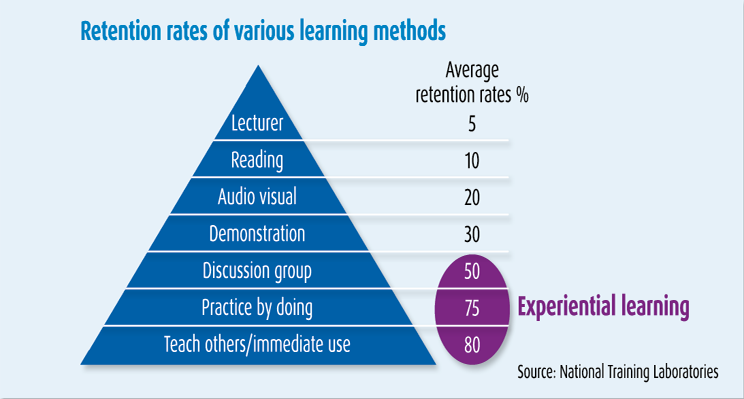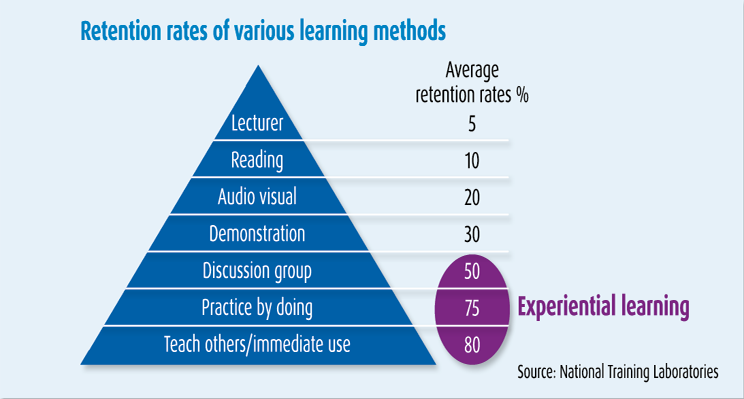I regularly read articles which discuss explicitly or implicitly how training improves the performance of individuals, teams and whole organisations. Some of them offer good, solid evidence and I will reference a few here and draw attention to the benefits of using business management games.
The UK lags behind many of its European competitors in terms of productivity. This is an issue that really concerns me and one where I have both strong views and a few ideas. So, here’s my summary of the situation and my argument why all organisations should step up and start developing their employees’ skills.

The UK is leaving the EU and we need to ensure that all organisations invest in learning and development (L&D) to enable them to successfully compete in new markets as well as existing markets with different rules. I know I’m not alone here, Steve Hill, the external engagement director at the Open University stated, “The UK’s productivity keeps falling behind other developed countries, and this is unlikely to improve unless firms invest properly in training.”
The UK average (L&D) spend per employee is £1,068, (The Bersin UK corporate learning factbook for 2016). This represents an uplift of between 10-16% on previous years since the recession. Whilst there has been an increase in both L&D spend and the number of training hours, is the effort being directed in the most appropriate way? The report also reveals that instructor-led training accounts for almost a third of training hours. However, it is being superseded by less formal methods; online learning, experiential learning, on-the-job training and collaboration. Business management games can be used in the face to face environment and online and, with the right facilitation make use of experiential learning and all this offers the learner.
Investment in management training increases productivity and staff retention across the organisation
“Managers are the occupational group least likely to receive training, but will be instrumental in decisions about business and people strategies.” (The Employer Skills Survey 2015, conducted by the UK Commission for Employment and Skills (UKCES))
When I read statements like this I get even more worried about the ability of organisations to compete and thrive. Middle managers are one of the most important groups in any organisation, translating the Senior Executive’s strategy into actions. Yet, the research also found that 48% of UK managers had not received any training during the 12 months before the survey took place.
Let me focus on three areas where the failure to invest in management training can negatively impact an organisation’s success and where I think business management games can help.
Lower productivity
According to research by the Department for Business, Innovation and Skills, “Official estimates which compare the UK’s productivity performance with that of its major competitors in the G7 show that GDP per hour worked in the UK is on a par with that of Canada and around 15 percentage points higher than in Japan (ONS, 2014). However, these estimates indicate that productivity in the UK is around 10 percentage points lower than in Italy and 28-30 percentage points lower than in Germany, France and the US. The UK, therefore, performs rather poorly in international comparisons of productivity levels.”
Ouch, that’s a big gap. But it doesn’t have to be this way. Research by the CMI shows “those who do develop their managers see up to 23% improvements in organisational performance.”
Business management games help raise productivity directly through the additional skills acquired and indirectly through improvements in motivation and engagement.
Inability to attract the best staff
One of the things that candidates look for in a new role is opportunities for personal development. In response to The Employer Skills Survey a spokesperson for the CMI said, “British firms may grumble about ‘talent poverty’ but it’s a direct result of businesses’ under-investment in management skills training – especially for more senior roles. Half of candidates lack professional management and leadership skills because the majority of employers don’t offer training to first-time managers.”
The message is clear: give people basic management training from the beginning. This gives them a secure foundation that can be built on as their career progresses.
Inability to retain the best staff
Organisations that fail to invest in the early stages of a manager’s career may end up with a layer of middle managers poorly equipped and unable to manage a team. The result is likely to be higher turnover as dissatisfied staff leave. In 2015 the CIPD reported that “nearly half (42 per cent) of employees have left a job because of a bad boss,” which backs up the notion that “people don’t leave bad companies, they leave bad bosses.” However, it could be worse. If staff don’t leave they might stick around but become disengaged and disruptive. We have returned full circle to the problem of lower productivity. So when making the decision about whether to invest in developing management skills it’s worth remembering that, “an employee’s relationship with his or her direct manager is the most important single factor in employee engagement.”
What skills are managers lacking?
The UKCES found that managers, compared to other UK employees, were more likely to be lacking in skills relating to:
- Objective setting and planning resources
If managers cannot do this then you have a whole team or department that is rudderless and not contributing effectively to the organisation or its strategic goals. Potentially the team is working in conflict with the rest of the business.
- Managing or motivating other staff
Managers need to be able to ‘get their team onboard’ (by explaining what needs to be done and why) and to tap into each individual’s desire to perform. They also must be able to make tough decisions. For example, tackling underperformance and team conflicts.
Learning by doing: The benefits of experiential learning
Traditional learning approaches are passive and don’t always allow participants to practise new skills and behaviours. Experiential learning is more effective at engaging participants in ‘learning by doing’, driving at least 75% retention. So, if you think your staff could benefit from a development activity, ditch the speech from the MD, the half-day PowerPoint lecture and the mandatory online session and think about a more interactive group experience.

Look for something that can give the theory and allow people to try it out. Business management games provide this as well as delivering:
- Improved engagement
- Greater understanding
- Increased retention
Experiential activities allow participants to own their learning experience.
To find out more read our whitepaper.
In doubt? Start small
Training doesn’t have to be a long and arduous process or come at great expense. Business Management Games can be fun and engaging. A competent manager could use one of our tried and tested packages in a team meeting.
If you want to take the plunge and tackle a bigger issue or one you feel is specific to your organisation then you could think of getting a business management game designed for your organisation.


